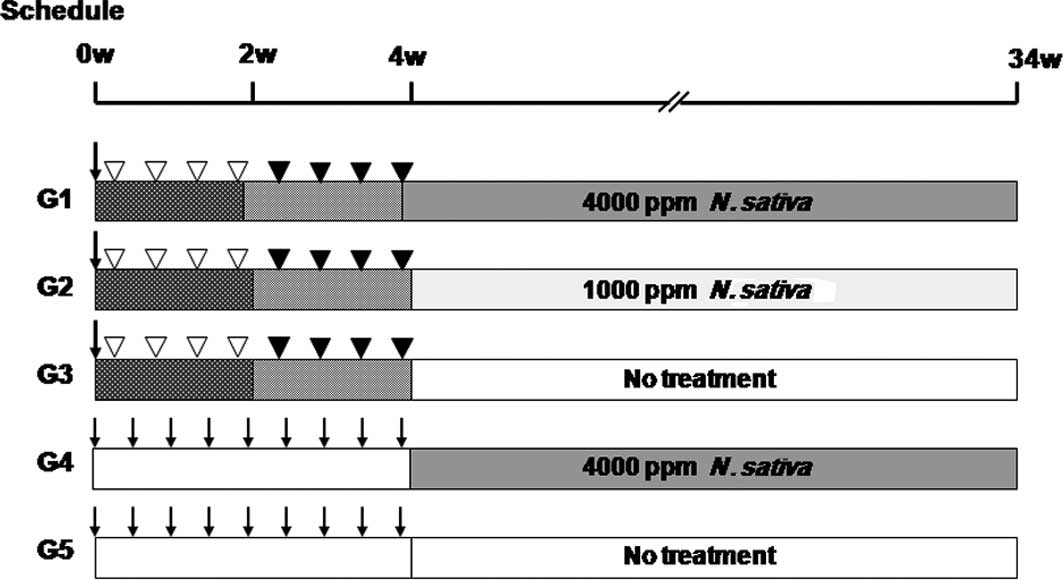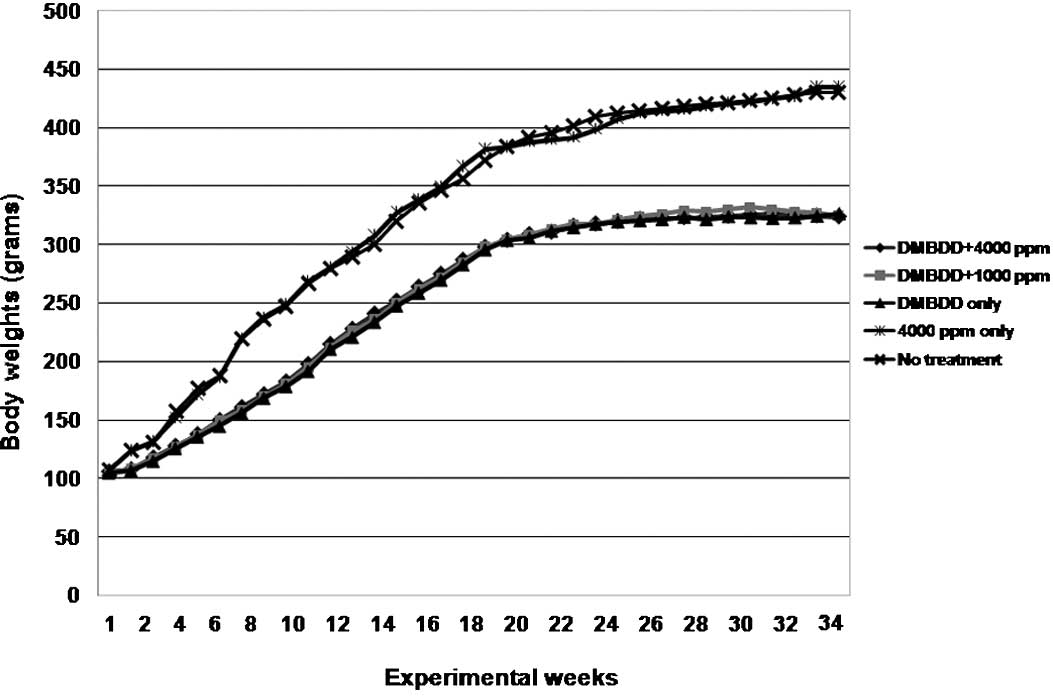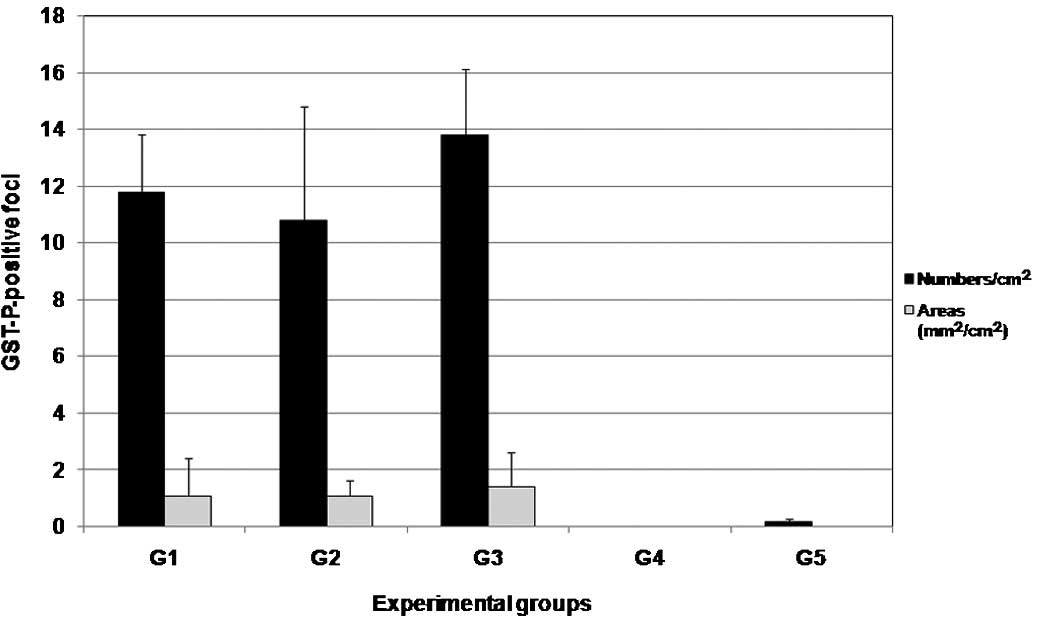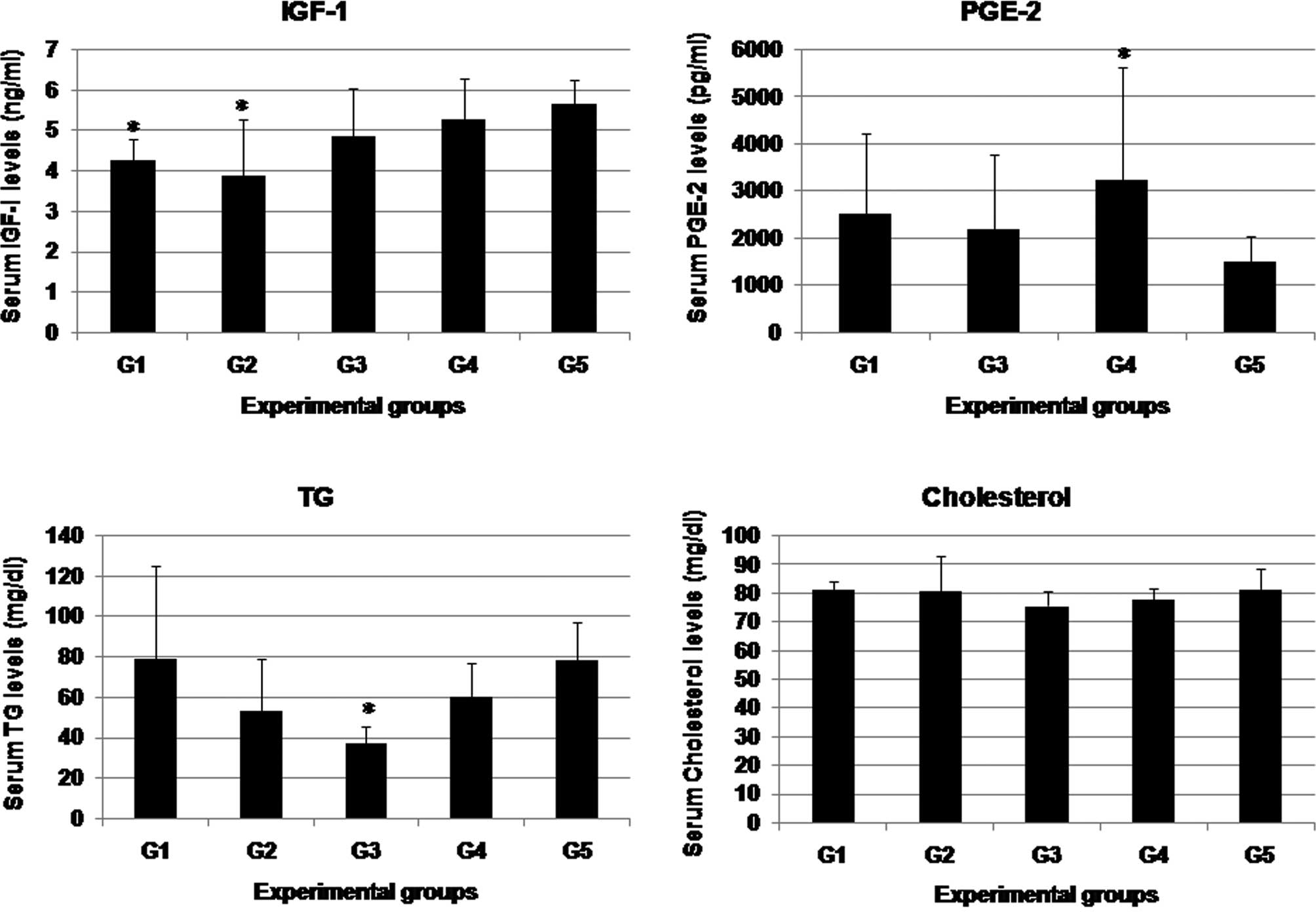|
1
|
Khan N and Sultana S: Inhibition of two
stage renal carcinogenesis, oxidative damage and hyperproliferative
response by Nigella sativa. Eur J Cancer Prev. 14:159–168.
2005. View Article : Google Scholar : PubMed/NCBI
|
|
2
|
Farah IO: Assessment of cellular responses
to oxidative stress using MCF-7 breast cancer cells, black seed
(N. Sativa L.) extracts and H2O2. Int
J Environ Res Public Health. 2:411–419. 2005. View Article : Google Scholar : PubMed/NCBI
|
|
3
|
Hanafy M and Hatem M: Studies on the
antimicrobial activity of Nigella sativa seed (black cumin).
J Ethnopharmacol. 34:275–278. 1991. View Article : Google Scholar
|
|
4
|
Salomi N, Nair S, Jayawardhanan K,
Varghese D and Panikkar K: Anti-tumor principles from Nigella
sativa seeds. Cancer Lett. 63:41–46. 1992. View Article : Google Scholar
|
|
5
|
Landa P, Marsik P, Havlik J, Kloucek P,
Vanek T and Kokoska L: Evolution of antimicrobial and
anti-inflammatory activities of seed extracts from six
Nigella species. J Med Food. 12:408–415. 2009. View Article : Google Scholar : PubMed/NCBI
|
|
6
|
Suboh SM, Bilto YY and Aburjai TA:
Protective effects of selected medicinal plants against protein
degradation, lipid peroxidation and deformability loss of
oxidatively stressed human erythrocytes. Phytother Res. 18:280–284.
2004. View Article : Google Scholar
|
|
7
|
Salim EI and Fukushima S: Chemopreventive
potential of volatile oil from black cumin (Nigella sativa
L.) seeds against rat colon carcinogenesis. Nutr Cancer.
45:195–202. 2003. View Article : Google Scholar : PubMed/NCBI
|
|
8
|
Ito N, Shirai S and Fukushima S:
Medium-term for carcinogens using multiorgan models. In:
Modification of Tumor Development in Rodents. Progress in
Experimental Tumor Research. Ito N and Sugano H: Karger; Basel: pp.
41–57. 1991
|
|
9
|
Ito N, Tsuda H, Tatematsu M, et al:
Enhancing effect of various hepatocarcinogens on induction of
preneoplastic glutathione S-transferase placental form positive
foci in rats – an approach for a new medium-term bioassay system.
Carcinogenesis. 9:387–394. 1988.PubMed/NCBI
|
|
10
|
Kurata Y, Hagiwara A, Tamano S, Shibata M,
Tanaka H, Yamada M, Ito H and Fukushima S: Modifying effects of
beraprost sodium (TRK-100) on N-methyl-N-nitrosourea (MNU)
carcinogenesis in F344 rats. J Toxicol Sci. (Suppl 1): 1–39. 1989.
View Article : Google Scholar : PubMed/NCBI
|
|
11
|
Konishi Y, Yamamoto K, Eimoto H, Tsutsumi
M, Sugimura M, Nii H and Mori Y: Carcinogenic activity of
endogenously synthesized N-nitrosobis(2-hydroxypropyl)amine in
rats. IARC Sci Publ. 105:318–321. 1991.PubMed/NCBI
|
|
12
|
Bird RP: Observation and quantification of
aberrant crypts in the murine colon treated with a colon
carcinogen: preliminary findings. Cancer Lett. 37:147–151. 1987.
View Article : Google Scholar : PubMed/NCBI
|
|
13
|
Salim EI, Wanibuchi H, Morimura K, Kim S,
Yano Y, Yamamoto S and Fukushima S: Inhibitory effects of
1,3-diaminopropane, an ornithine decarboxylase inhibitor, on rat
two-stage urinary bladder carcinogenesis initiated by
N-butyl-N-(4-hydroxybutyl)nitrosamine. Carcinogenesis. 21:195–203.
2000. View Article : Google Scholar
|
|
14
|
Spinardi-Barbisan AL, Kaneno R, Rodrigues
MA, Fávero Salvadori DM, Trindade Moreira EL, Barbisan LF and Viana
de Camargo JL: Lymphoproliferative response and T lymphocyte
subsets in a medium-term multiorgan bioassay of carcinogenesis in
Wistar rats. Cancer Lett. 154:121–129. 2000. View Article : Google Scholar : PubMed/NCBI
|
|
15
|
Doi K, Sakai K, Tanaka R, Toma K,
Yamaguchi T, Wei M, Fukushima S and Wanibuchi H: Chemopreventive
effects of 13alpha, 14alpha-epoxy-3beta-methoxyserratan-21beta-ol
(PJJ-34), a serratane-type triterpenoid, in a rat multi-organ
carcinogenesis bioassay. Cancer Lett. 289:161–169. 2009. View Article : Google Scholar : PubMed/NCBI
|
|
16
|
Hagiwara A, Tanaka H, Imaida K, Tamano S,
Fukushima S and Ito N: Correlation between medium-term multi-organ
carcinogenesis bioassay data and long-term observation results in
rats. Jpn J Cancer Res. 84:237–245. 1993. View Article : Google Scholar : PubMed/NCBI
|
|
17
|
Mabrouk GM, Moselhy SS, Zohny SF, Ali EM,
Helal TE, Amin AA and Khalifa AA: Inhibition of methylnitrosourea
(MNU) induced oxidative stress and carcinogenesis by orally
administered bee honey and Nigella grains in Sprague Dawely
rats. J Exp Clin Cancer Res. 21:341–346. 2002.PubMed/NCBI
|
|
18
|
Badary OA and Gamal El-Din AM: Inhibitory
effects of thymoquinone against 20-methylcholanthrene-induced
fibrosarcoma tumorigenesis. Cancer Detect Prev. 25:362–368.
2001.PubMed/NCBI
|
|
19
|
Banerjee S, Kaseb AO, Wang Z, Kong D,
Mohammed M, Padhye S, Sarkar FH and Mohammed RM: Antitumor activity
of gemcitabine and oxaliplatin is augmented by thymoquinone in
pancreatic cancer. Cancer Res. 69:5575–5583. 2009. View Article : Google Scholar : PubMed/NCBI
|
|
20
|
Babayan VK, Koottungal D and Halaby GA:
Proximate analysis, fatty acid, and amino acid composition of
Nigella sativa L. seeds. J Food Sci. 43:1314–1319. 1978.
View Article : Google Scholar
|
|
21
|
Ali BH and Blunden G: Pharmacological and
toxicological properties of Nigella sativa. Phytother Res.
17:299–305. 2003. View Article : Google Scholar
|
|
22
|
Ghosheh OA, Houdi AA and Crooks PA: High
performance liquid chromatographic analysis of the
pharmacologically active quinines and related compounds in the oil
of the black seed (Nigella sativa L.). J Pharm Biomed Anal.
19:757–762. 1999. View Article : Google Scholar : PubMed/NCBI
|
|
23
|
Morikawa T, Xu F, Ninomiya K, Matsuda H
and Yoshikawa M: Nigellamines A3, A4, A5, and C, new
dolabellane-type diterpene alkaloids, with lipid
metabolism-promoting activities from the Egyptian medicinal food
black cumin. Chem Pharm Bull. 52:494–497. 2004. View Article : Google Scholar : PubMed/NCBI
|
|
24
|
Liu YM, Yang JS and Liu QH: A new alkaloid
and its artificial derivative with an indazole ring from Nigella
glandulifera. Chem Pharm Bull. 52:454–455. 2004. View Article : Google Scholar : PubMed/NCBI
|
|
25
|
Islam SN, Begum P, Ahsan T, Huque S and
Ahsan M: Immunosuppressive and cytotoxic properties of Nigella
sativa. Phytother Res. 18:395–398. 2004. View Article : Google Scholar : PubMed/NCBI
|
|
26
|
Le PM, Benhaddou-Andaloussi A, Elimadi A,
Settaf A, Cherrah Y and Haddad PS: The petroleum ether extract of
Nigella sativa exerts lipid-lowering and insulin-sensitizing
actions in the rat. J Ethnopharmacol. 94:251–259. 2004.PubMed/NCBI
|
|
27
|
Kocyigit Y, Atamer Y and Uysal E: The
effect of dietary supplementation of Nigella sativa L. on
serum lipid profile in rats. Saudi Med J. 30:893–896.
2009.PubMed/NCBI
|
|
28
|
Yi T, Cho SG, Yi Z, Pang X, Rodriguez M,
Wang Y, Sethi G, Aggarwal BB and Liu M: Thymoquinone inhibits tumor
angiogenesis and tumor growth through suppressing AKT and
extracellular signal-regulated kinase signalling pathways. Mol
Cancer Ther. 7:1789–1796. 2008. View Article : Google Scholar : PubMed/NCBI
|
|
29
|
Chakraborty T, Chatterjee A, Rana A,
Srivastawa S, Damodaran S and Chatterjee M: Cell proliferation and
hepatocarcinogenesis in rat initiated by diethylnitrosamine and
promoted by phenobarbital: potential roles of early DNA damage and
liver metallothionein expression. Life Sci. 81:489–499. 2007.
View Article : Google Scholar
|
|
30
|
Gratzner HG: Monoclonal antibody to
5-bromo-2 and 5-iododeoxyuridine: a new reagent for detection of
DNA replication. Science. 218:474–475. 1982. View Article : Google Scholar : PubMed/NCBI
|
|
31
|
McGinley JN, Knott KK and Thompson HJ:
Effect of fixation and epitope retrieval on BrdU indices in mammary
carcinomas. J Histochem Cytochem. 48:355–362. 2000. View Article : Google Scholar : PubMed/NCBI
|
|
32
|
Rosenfeld RG, Wilson DM, Lee PD and Hintz
RL: Insulin-like growth factors I and II in evaluation of growth
retardation. J Pediatr. 109:428–433. 1986. View Article : Google Scholar : PubMed/NCBI
|
|
33
|
Bucolo G and David H: Quantitative
determination of serum triglycerides by the use of enzymes. Clin
Chem. 19:476–482. 1973.PubMed/NCBI
|
|
34
|
Allain CC, Poon LS, Chan CS, Richmond W
and Fu PC: Enzymatic determination of total serum cholesterol. Clin
Chem. 20:470–475. 1974.PubMed/NCBI
|
|
35
|
Wasan KM, Holtorf L, Subramanian R,
Cassidy SM, Pritchard PH, Stewart DJ, Novak E and Moghadasian MH:
Assessing plasma pharmacokinetics of cholesterol following oral
co-administration with a novel vegetable stanol mixture to fasting
rats. J Pharm Sci. 90:23–28. 2001. View Article : Google Scholar : PubMed/NCBI
|
|
36
|
Boorman GA, Eustis SL, Elwell MR,
Montgomry CA and MacKenzie WF: Pathology of the Fischer Rat
Reference & Atlas. Academic Press; San Diego: 1990
|
|
37
|
Hsu SM, Raine L and Fanger H: Use of
avidin-biotin-peroxidase complex (ABC) in immunoperoxidase
techniques: a comparison between ABC and unlabeled antibody (PAP)
procedures. J Histochem Cytochem. 29:577–580. 1981. View Article : Google Scholar : PubMed/NCBI
|
|
38
|
El-Aziz MA, Hassan HA, Mohamed MH, Meki
AR, Abdel-Ghaffar SK and Hussein MR: The biochemical and
morphological alterations following administration of melatonin,
retinoic acid and Nigella sativa in mammary carcinoma: an
animal model. Int J Exp Pathol. 86:383–396. 2005.PubMed/NCBI
|
|
39
|
Salomi MJ, Nair SC and Pannikar KR:
Inhibitory effects of Nigella sativa and Saffron (Crocus
sativus) on chemical carcinogenesis in mice. Nutr Cancer.
16:67–72. 1991.
|
|
40
|
El-Mofty MM, Abdel-Galil AM, Shwaireb MH,
et al: Prevention of skin tumors induced by
7,12-dimethylbenz(a)anthracene in mice by black seed oil. Oncol
Rep. 4:139–141. 1997.PubMed/NCBI
|
|
41
|
Al-Johar D, Shinwari N, Arif J, Al-Sanea
N, Jabbar AA, El-Sayed R, Mashhour A, Billedo G, El-Doush I and
Al-Saleh I: Role of Nigella sativa and a number of its
antioxidant constituents towards azoxymethane-induced genotoxic
effects and colon cancer in rats. Phytother Res. 22:1311–1323.
2008.
|
|
42
|
Rooney S and Ryan MF: Effects of
alpha-hederin and thymoquinone, constituents of Nigella
sativa, on human cancer cell lines. Anticancer Res.
25:2199–2204. 2005.PubMed/NCBI
|
|
43
|
Gali-Muhtasib H, Diab-Assaf M, Boltze C,
Al-Hmaira J, Hartig R, Roessner A and Schneider-Stock R:
Thymoquinone extracted from black seed triggers apoptotic cell
death in human colorectal cancer cells via a p53-dependent
mechanism. Int J Oncol. 25:857–866. 2004.PubMed/NCBI
|
|
44
|
Norwood AA, Tan M, May M, Tucci M and
Benghuzzi H: Comparison of potential chemotherapeutic agents,
5-fluoruracil, green tea, and thymoquinone, on colon cancer cells.
Biomed Sci Instrum. 42:350–356. 2006.PubMed/NCBI
|
|
45
|
Kumara SS and Huat BT: Extraction,
isolation and characterisation of antitumor principle,
alpha-hederin, from the seeds of Nigella sativa. Planta Med.
67:29–32. 2001. View Article : Google Scholar : PubMed/NCBI
|
|
46
|
Farah N, Benghuzzi H, Tucci M and Cason Z:
The effects of isolated antioxidants from black seed on the
cellular metabolism of A549 cells. Biomed Sci Instrum. 41:211–216.
2005.PubMed/NCBI
|
|
47
|
Abbas AT, Abdel-Aziz MM, Zalata KR and
el-D Abd Al-Galel T: Effect of dexamethasone and Nigella
sativa on peripheral blood eosinophil count, IgG1 and IgG2a,
cytokine profiles and lung inflammation in a murine model of
allergic asthma. Egyp J Immunol. 12:95–102. 2005.
|
|
48
|
El Mezayen R, El Gazzar M, Nicolls MR,
Marecki JC, Dreskin SC and Nomiyama H: Effect of thymoquinone on
cyclooxygenase expression and prostaglandin production in a mouse
model of allergic airway inflammation. Immunol Lett. 106:72–81.
2006.PubMed/NCBI
|
|
49
|
Hossein BM, Nasim V and Sediqa A: The
protective effect of Nigella sativa on lung injury of sulfur
mustard-exposed Guinea pigs. Exp Lung Res. 34:183–194. 2008.
|
|
50
|
Keyhanmanesh R, Boskabady MH, Eslamizadeh
MJ, Khamneh S and Ebrahimi MA: The effect of thymoquinone, the main
constituent of Nigella sativa, on tracheal responsiveness
and white blood cell count in lung lavage of sensitized Guinea
pigs. Planta Med. 76:2187–222. 2009.
|
|
51
|
Kanter M: Effects of Nigella sativa
seed extract on ameliorating lung tissue damage in rats after
experimental pulmonary aspirations. Acta Histochem. 111:393–403.
2009.
|
|
52
|
El Gazzar M, El Mezayen R, Nicolls MR,
Marecki JC and Dreskin SC: Downregulation of leukotriene
biosynthesis by thymoquinone attenuates airway inflammation in a
mouse model of allergic asthma. Biochim Biophys Acta.
1760:1088–1095. 2006.PubMed/NCBI
|
|
53
|
Boskabady MH and Farhadi J: The possible
prophylactic effect of Nigella sativa seed aqueous extract
on respiratory symptoms and pulmonary function tests on chemical
war victims: a randomized, double-blind, placebo-controlled trial.
J Altern Complement Med. 14:1137–1144. 2008.
|
|
54
|
Badary OA, Al-Shabanah OA, Nagi MN,
Al-Rikabi AC and Elmazar MM: Inhibition of benzo(a)pyrene-induced
forestomach carcinogenesis in mice by thymoquinone. Eur J Cancer
Prev. 8:435–440. 1999. View Article : Google Scholar : PubMed/NCBI
|
|
55
|
Al Mofleh IA, Alhaider AA, Mossa JS,
Al-Sohaibani MO, Al-Yahya MA, Rafatullah S and Shaik SA:
Gastroprotective effect of an aqueous suspension of black cumin
Nigella sativa on necrotizing agent-induced gastric injury
in experimental animals. Saudi J Gastroenterol. 14:128–134.
2008.PubMed/NCBI
|
|
56
|
Kanter M, Demir H, Karakaya C and Ozbek H:
Gastroprotective activity of Nigella sativa L oil and its
constituent, thymoquinone, against acute alcohol-induced gastric
mucosal injury in rats. World J Gastroenterol. 11:6662–6666.
2005.
|
|
57
|
Kanter M, Coskun O and Uysal H: The
antioxidative and antihistaminic effect of Nigella sativa
and its major constituent, thymoquinone, on ethanol-induced gastric
mucosal damage. Arch Toxicol. 80:217–224. 2006.PubMed/NCBI
|
|
58
|
El-Abhar HS, Abdallah DM and Saleh S:
Gastroprotective activity of Nigella sativa oil and its
constituent, thymoquinone, against gastric mucosal injury induced
by ischaemia/reperfusion in rats. J Ethnopharmacol. 84:251–258.
2003.
|
|
59
|
Morimura S, Susuki T, Hochi S, Yuki A,
Nomura K and Kitagawa T: Transactivation of GST-P gene during
hepatocarcinogenesis of rat. Proc Natl Acad Sci USA. 90:2065–2068.
1993. View Article : Google Scholar : PubMed/NCBI
|
|
60
|
Ogiso T, Tatematsu M, Tamano S, Tsuda H
and Ito N: Comparison of dose dependent effects of chemical
carcinogens on induction of glutathione S-transferase placental
form positive foci in a short term assay and of hepatocellular
carcinomas in a long-term assay. Toxicol Pathol. 13:257–265. 1985.
View Article : Google Scholar : PubMed/NCBI
|
|
61
|
Ogiso T, Tatematsu M, Tamano S, Hasegawa R
and Ito N: Correlation between medium-term bioassay system data and
results of long-term testing of rats. Carcinogenesis. 11:561–566.
1990. View Article : Google Scholar : PubMed/NCBI
|
|
62
|
Iddamaldeniya SS, Thabrew MI,
Wickramasinghe SM, Ratnatunge N and Thammitiyagodage MG: A
long-term investigation of the anti-hepatocarcinogenic potential of
an indigenous medicine comprised of Nigella sativa,
Hemidesmus indicus and Smilax glabra. J Carcinog.
9:5–11. 2006.PubMed/NCBI
|
|
63
|
Nagi MN and Almakki HA: Thymoquinone
supplementation induces quinone reductase and glutathione
transferase in mice liver: possible role in protection against
chemical carcinogenesis and toxicity. Phytother Res. 23:1295–1298.
2009. View Article : Google Scholar
|
|
64
|
Ibrahim ZS, Ishizuka M, Soliman M, ElBohi
K, Sobhy W, Muzandu K, Elkattawy AM, Sakamoto KQ and Fujita S:
Protection by Nigella sativa against carbon
tetrachloride-induced downregulation of hepatic cytochrome P450
isozymes in rats. Jpn J Vet Res. 56:119–128. 2008.
|
|
65
|
Ait Mbarek L, Ait Mouse H, Elabbadi N,
Bensalah M, Gamouh A, Aboufatima R, Benharref A, Chait A, Kamal M,
Dalal A and Zyad A: Anti-tumor properties of black seed (Nigella
sativa L.) extracts. Braz J Med Biol Res. 40:839–847.
2007.PubMed/NCBI
|
|
66
|
Cemek M, Enginar H, Karaca T and Unak P:
In vivo radioprotective effects of Nigella sativa L oil and
reduced glutathione against irradiation-induced oxidative injury
and number of peripheral blood lymphocytes in rats. Photochem
Photobiol. 82:1691–1696. 2006.
|
|
67
|
Nergiz C and Otles S: Chemical composition
of Nigella sativa L. seeds. Food Chem. 48:259–261. 1993.
View Article : Google Scholar
|
|
68
|
Bartsch H, Nair J and Owen RW: Dietary
polyunsaturated fatty acids and cancers of the breast and
colorectum: emerging evidence for their role as risk modifiers.
Carcinogenesis. 20:2209–2218. 1999. View Article : Google Scholar : PubMed/NCBI
|
|
69
|
Badary OA, Taha RA, Gamal El-Din AM and
Abdel-Wahab MH: Thymoquinone is a potent superoxide anion
scavenger. Drug Chem Toxicol. 26:87–98. 2003. View Article : Google Scholar
|
|
70
|
Ramadan MF, Kroh LW and Mörsel JT: Radical
scavenging activity of black cumin (Nigella sativa L.),
coriander (Coriandrum sativum L.), and niger (Guizotia
abyssinica Cass.) crude seed oils and oil fractions. J Agric
Food Chem. 51:6961–6969. 2003.PubMed/NCBI
|
|
71
|
Wattenberg LW: Chemoprevention of cancer
by naturally occur-ring and synthetic compounds. Cancer
Chemoprevention. Wattenberg L, Lipkin M, Boone CW and Keloff GJ:
CRC Press; Boca Raton: pp. 19–39. 1992
|
|
72
|
Mukhtar H, Das M and Bickers DR:
Inhibition of 3-methyl-cholanthrene-induced skin tumorigenesis in
BALB/c mice by oral feeding of trace amounts of ellagic acid in
drinking water. Cancer Res. 46:2262–2265. 1986.PubMed/NCBI
|
|
73
|
Ames BN, Gold LS and Willet WC: The causes
and prevention of cancer. Proc Natl Acad Sci USA. 92:5258–5265.
1995. View Article : Google Scholar : PubMed/NCBI
|
|
74
|
Grossmann ME, Mizuno NK, Dammen ML,
Schuster T, Ray A and Cleary MP: Eleostearic acid inhibits breast
cancer proliferation by means of an oxidation-dependent mechanism.
Cancer Prev Res. 2:879–886. 2009. View Article : Google Scholar : PubMed/NCBI
|
|
75
|
Prabhu PN, Ashokkumar P and Sudhandiran G:
Antioxidative and antiproliferative effects of astaxanthin during
the initiation stages of 1,2-dimethyl hydrazine-induced
experimental colon carcinogenesis. Fundam Clin Pharmacol.
23:225–234. 2009. View Article : Google Scholar
|
|
76
|
Beales IL and Ogunwobi OO: Microsomal
prostaglandin E synthase-1 inhibition blocks proliferation and
enhances apoptosis in oesophageal adenocarcinoma cells without
affecting endothelial prostacyclin production. Int J Cancer.
126:2247–2255. 2010.
|
|
77
|
Abu-Bedair FA, El-Gamal BA, Ibrahim NA and
El-Aaser AA: Serum lipids and tissue DNA content in Egyptian female
breast cancer patients. Jpn J Clin Oncol. 33:278–282. 2003.
View Article : Google Scholar : PubMed/NCBI
|
|
78
|
Menendez JA: Fine-tuning the
lipogenic/lipolytic balance to optimize the metabolic requirements
of cancer cell growth: molecular mechanisms and therapeutic
perspectives. Biochim Biophys Acta. 1801:381–391. 2010. View Article : Google Scholar
|


















